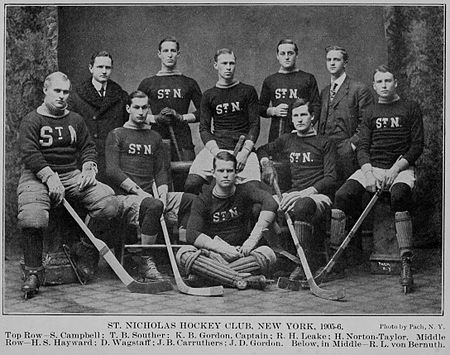The St. Nicholas Hockey Club is an ice hockey club from Manhattan, New York City. St. Nicholas Hockey Club played in the American Amateur Hockey League between 1896–1903 and 1905–1918 and won three championship titles, in 1907, 1914 and 1915.[3]
| St. Nicholas Hockey Club | |
|---|---|
| City | New York City |
| League | AAHL (1896–1903, 1905–1918) USAHA (1920–1923) |
| Founded | 1895 |
| Home arena | St. Nicholas Rink (1896–1962) Sky Rink at Chelsea Piers (Present) |
| Colors | Olive Green, White, Red [1][2] |


Between 1920–1923 the club played in the United States Amateur Hockey Association.
History
editThe St. Nicholas Hockey Club was an inaugural member of the American Amateur Hockey League (AAHL) for the 1896–97 season alongside the New York Athletic Club, the Brooklyn Crescents and the Brooklyn Skating Club. The St. Nicholas Hockey Club aggregation for the 1896–97 season consisted of several notable American tennis players such as William Larned, Henry Slocum, Malcolm Chace and Robert Wrenn.
Team captain Ken Gordon and goaltender Harold Hayward joined with four players from the New York Athletic Club to form the New York Wanderers prior to the 1903–04 AAHL season, and during the 1903–04 and 1904–05 AAHL seasons the St. Nicholas Hockey Club was not represented in the league.[4][5]
Famous American sportsman Hobey Baker, who was inducted into the Hockey Hall of Fame in 1945, played two seasons with the St. Nicholas Hockey Club in the AAHL between 1914 and 1916.
External links
edit- St. Nicholas Hockey Club (Official Website)
- New York St. Nicks Twitter (Official Twitter)
References
editNotes
edit- ^ St. Nicholas seven wins another leg on championship cup of hockey league The Brooklyn Daily Eagle, p. 15, March 12, 1915.
- ^ Popsy's Hockey Years stevelindsay.net
- ^ Spalding's official ice hockey guide 1918 at archive.org
- ^ "Hockey stars desert New York A. C. team" The Brooklyn Daily Eagle, November 28, 1903.
- ^ "First league hockey to-morrow night" The Brooklyn Daily Eagle, December 21, 1903.